I often see children and adults coming in for counseling because they are medicating or numbing themselves out to avoid the overwhelming feelings they have when things happen in life. They may be using alcohol or drugs or ritualistic behaviors or eating disorders, but all those behaviors have the same purpose. They are trying to escape the extreme distress or anxiety they feel in living in this world. They never learned the skills they need to manage their emotional response to the world. So we start by talking about how they weren’t taught these skills but they can learn them. First is resiliency – the ability to bounce back from life’s challenges. The second is distress tolerance – the ability to tolerate uncomfortable situations and feelings. Our work starts with taking away their blaming and shaming themselves. We work on letting go of their critical self-talk where they have internalized someone else telling them, “You’re just too sensitive,” and they toke that statement as confirming that there is something wrong with them. I often reflect to them that perhaps the other person was just “too harsh” for them and that only means that they were a mismatch in sensitivity. It’s not about either person being “good” or “bad.” Rather it is about the most common challenge in all relationships is the matching or mismatching of temperaments. Then we start our work on helping them to learn the skills they didn’t learn as a child – how to tolerate uncomfortable feelings and how to bounce back from life’s challenges – with graduated exposure and challenging the meaning they assign to things that happen. If they are still living with their parents then we often need some family sessions to help all of them to understand what has been happening. Sometimes the toughest part of this process is to get the overly “harsh” person to step back and look at how their behaviors have been negatively affecting their child. Unfortunately I often hear the response, “I am their parent and I know what is best for them!” I often then reflect back to that parent, “And how’s that working for you? Are you getting the results you want? If not then perhaps it is time to look at how to modify the interaction in order to get a different outcome.” I love the 12 Step saying that “Doing the same thing over and over again, expecting different results is the definition of insanity!”
Clearing Your Head and Healing Your Heart
Putting the Pieces Together (So We Make Sense of Ourselves, Others and Our World)
Lois Zsarnay, LMFT, CEDS, CCTP, EMDR, BCPC, RD
Family Therapy Ventura, California
(805) 650-0507
©2015 Lois Zsarnay, LMFT, CEDS, CCTP, EMDR, BCPC, RD
